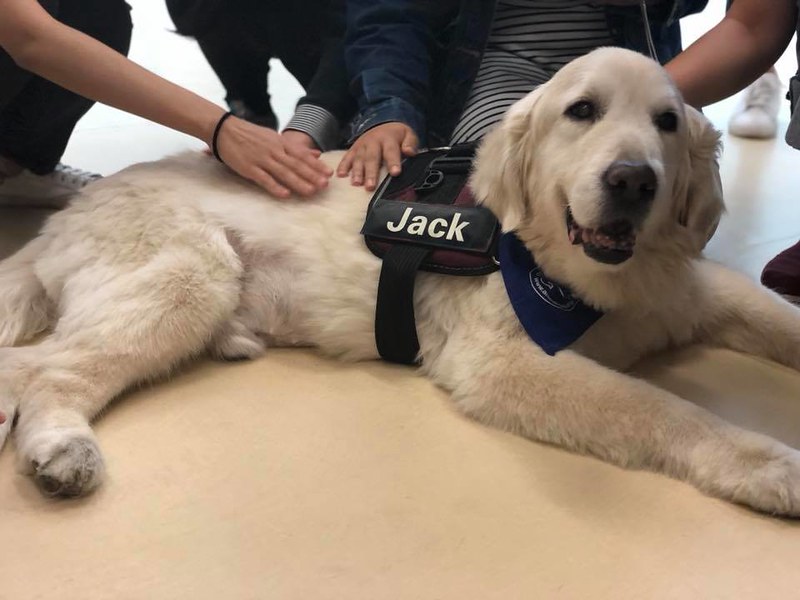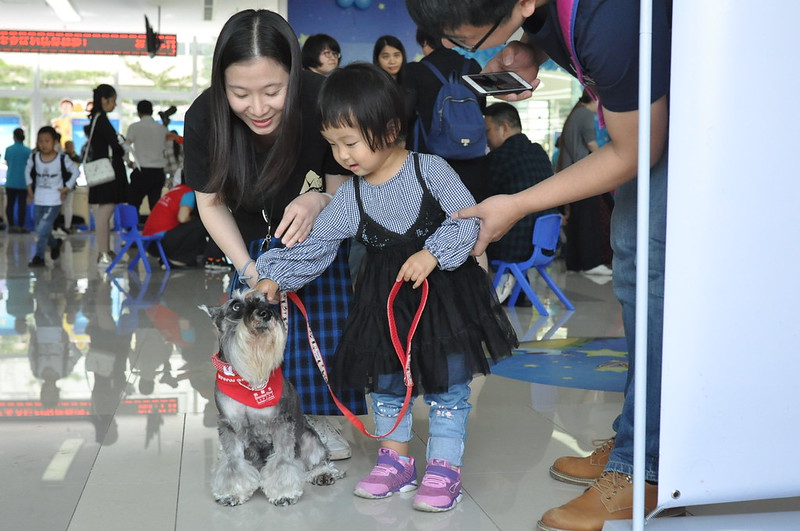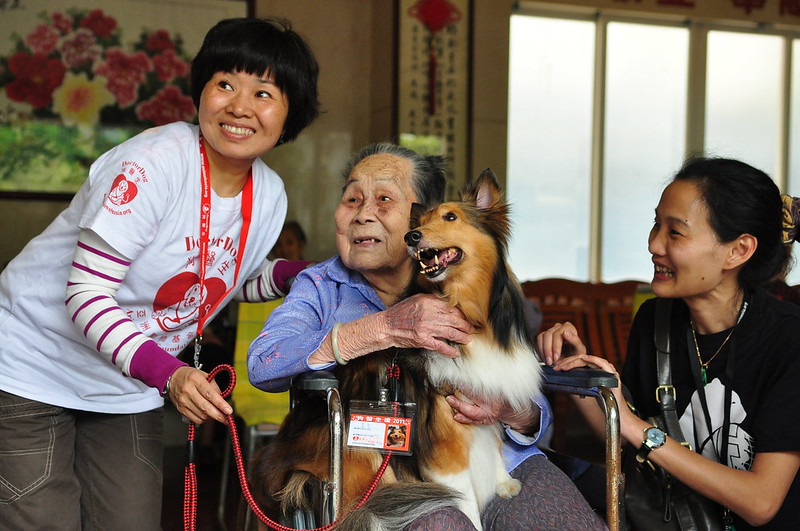International Assistance Dog Week: How I’ve seen therapy dogs change lives for the better
07 August 2018
Friend, counsellor, teacher, doctor – these are just some of the roles filled by canine therapists enriching lives and changing attitudes in China.
By Karina O'Carroll, Animal Welfare Education Manager
Dogs are much more than just our friends. For me they are also colleagues and in our daily work, I see them become counsellor to those with mental health challenges, teacher to those with no concept of animal welfare, and doctor to those for whom medical science has no solutions.
Assistance dogs take on these incredible roles through our Doctor Dog and Professor Paws programmes and I’ve seen first hand how their interaction with the people of Hong Kong and Guangzhou is changing people’s attitudes towards animal welfare and dogs.
Teacher
It is unfortunate that many children in Asia grow up being told that all dogs are dangerous. To combat this misconception, we bring Professor Paws assistance dogs to local schools.
One of the best assistance animals at changing perceptions was beautiful golden retriever, Jack. He visited mainstream and special needs schools all over Hong Kong and was so well-loved, it wasn’t unusual for him to be spotted on the street by his new human friends who would rush over to pet him, scratch his head and even give him big hugs.
Sadly, Jack passed away recently, but his infectious personality remains fondly remembered and the long-lasting effects of his work live on.
Counsellor
While some young people are misinformed about dogs, others have suffered negative experiences. For students who have experienced past trauma involving dogs, it can be very difficult to trust again and their level of fear can be heartbreaking.
But through Doctor Dog, we have been able to play a part in building confidence, reducing fear and enabling behavior change – and it’s all through positive interaction with our registered therapy dogs.
I recall a student who had been bitten at a young age by a dog near his home. He was left believing all dogs would hurt him and when he heard therapy animals were coming to his school, he was scared.
In cases like these no one is ever forced to interact with our therapy dogs – for both their safety and the safety and welfare of the dog. We simply encourage the individual to sit where they feel comfortable and visually observe the interactions experienced by their peers.
This little boy sat by the door while a teacher sat with him and explained the interactions he was watching. Therapy dog Oscar was playing with the children in the class and they were all laughing and having great fun, which was all our scared little boy needed to see.
He decided on his own that he wanted to play with Oscar, too. Cautiously at first, and with support from his teacher and our staff, he approached Oscar and let him sniff his hand. Oscar obliged in the most gentle of ways, with an almost sixth sense that this new little friend was apprehensive. Following the sniff, the boy raised his hand and bravely went to pat Oscar’s head. His little face lit up and we knew his fear had been overcome.
Canine counsellors also visit universities in Hong Kong and help students overcome stress. Around exam time suicide rates throughout China increase as students struggle to cope with the pressure.
Our canine therapists visit these stressed out students to give them a moment of simplicity to take their mind off their studies and remind them there is more to life than exams.
One university student told me she wished the dogs could be on campus permanently. “They alleviate stress for just a moment and I really do feel better spending time with them,” she said.
Doctor
Our Doctor Dog volunteers visit the elderly and the sick in hospitals across Hong Kong and in Guangzhou.
Many elderly patients live with dementia and other physical, psychological and emotional special needs. When the dogs visit, we see the faces of these elderly patients light up and their level of interest in socialising and communicating increases, enriching their lives.
But some of the greatest care I have ever witnessed from an assistance animal was when one of our Doctor Dogs visited an end-stage cancer patient at Hong Kong’s United Christian Hospital.
Tragically, all medical solutions had been exhausted and the patient had no hope of recovery. Therapy dog Oscar and his guardian took time off to visit and offer some solace.
Oscar gave the patient and their family a much-needed moment of respite from the emotional pain they were going through. For the duration of his visit, they were no longer saying goodbyes to loved ones, they were a family having fun again.
Oscar gave them all one last moment of happiness and normalcy together. One last happy memory.
We received a card later which touched us all. It said, “Thank you for bringing this lovely dog to meet with us, this has given me great joy and happiness for the day, to which any miracle drug available is incomparable”.
It’s moments like that which make you realise just how powerful the aid of an assistance animal can be.
Doctor Dog and Professor Paws have been helping people with mental and physical health challenges and educating the public in China since 1991. To date, more than 600,000 people have been educated, consoled and had their lives brightened by these incredible canine therapists.
BACK









